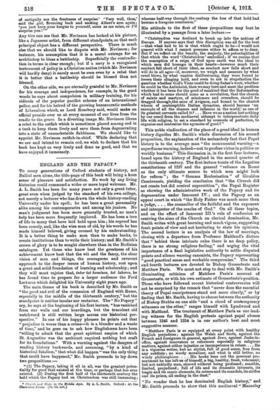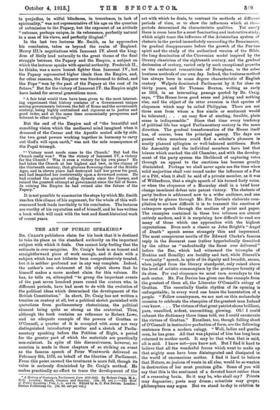ENGLAND AND THE PAPACY.* To many generations of Oxford students
of history, not Balliol men alone, the title-page of this book will bring a keen sense of pleasure and satisfaction. No work by any living historian could command a wider or more loyal welcome. Mr. A. L. Smith has been for many years not only a great tutor, great even when judged by the standard of his own college, not merely a lecturer who has drawn the whole history-reading University under his spell; he has been a great personality alike among his contemporaries and among his juniors. No man's judgment has been more generally trusted, no man's help has been more frequently implored. He has been a tree of life to many that have laid hold upon him ; his reproof has been comely, and, like the wise man of old, by his words he has made himself beloved, giving counsel by his understanding.
It is a better thing to make men than to make books, to create institutions than to write their history; and Mr. Smith's crown of glory is to be sought elsewhere than in the Bodleian catalogue. Yet those who know best the greatness of his achievement know best that the wit and the fancy, the clear
vision of men and things, the courageous and reverent approach to the deeper issues of human history, rest upon a great and solid foundation of learning and scholarship ; and they will most rejoice that, inter tot homines, tot labores, he has found time to prepare for a larger audience the Ford
Lectures which delighted his University eight years ago.
The main theme of his book is described by Mr. Smith as " the good and evil of the connexion of England with Rome, especially in the middle of the thirteenth century," but the standpoint is neither insular nor sectarian. The " No Popery " cry, he says at the beginning of his first lecture, "has vanished from our walls and our hoarding; but the truculent old watchword is still written large across our historical per- spective." In one of his happy phrases he points out that "prejudice is worse than a crime—it is a blunder and a waste of time," and he goes on to ask how Englishmen have been "willing to admit that the great spiritual empire of which St. Augustine was the architect required nothing but craft for its foundations." With a warning against the dangers of reading history backwards, and assuming, "by a kind of historical fatalism," that what did happen " was the only thing that could have happened," Mr. Smith proceeds to lay down two propositions :—
"(1) The Papacy, taking it all in all, was the greatest poten- tiality for good that existed at the time, or perhaps that has ever existed. (2) During the first half of the thirteenth century the hold which the Papacy had on Christendom was still increasing ; • Oozed, and State in the Middle Ages. By A. L. Smith. Oxford : At the Clarendon Press. 17s. G1. net.] whereas half-way through the century the loss of that hold bad become a foregone conclusion."
His attitude to the first of these Propositions may best be illustrated by a passage from a later lecture:-
" Christendom was destined to break up into the nations of Europe. If anyone says that this disruption was all for the best —that what had to be is that which ought to be—I would not quarrel with what I cannot presume either to affirm or to deny. But if we reflect on the beauty, the majesty, the potentialities of that which the word ' Christendom' embodied ; if we realize that the conception of a reign of God upon earth was the ideal to which men did homage in their hearts—however much their conduct fell short of their ideal, as conduct now falls short and will do in all ages—if, moreover, we weigh and measure by what cruel blows, by what wanton disillusioning, they were forced to loosen their clinging hold, and even to ask in stupefaction the question whether God's Vicar could be doing Satan's work, whether he could be the Antichrist, then we may turn and meet the problem whether it has been for the good of mankind that the Reformation which had to come should come as a revolution, that the church of saints and martyrs, of missioners and crusaders, should be dragged through-the mire of Avignon, and bound to the chariot wheels of contemptible Italian dynasties, should become an example of all the shames and infamies in the world,' as one of its greatest servants called it ? . . . Have we as a nation lost nothing by our recoil from the mediaeval attempt to interpenetrate daily life with religion, to set a standard by counsels of perfection, to organize and centralize the agencies of good ? "
This noble vindication of the place of a great ideal in human history dignifies Mr. Smith's whole discussion of his second
proposition, the explanation of the melancholy fact that Papal history is to the average man " the monumental warning—a superfluous warning, indeed—not to profess virtue in politics or worldly business." This discussion is, in the first four lectures, based upon the history of England in the second quarter of the thirteenth century. The first lecture treats of the Legatine constitutions of 1237 and the general "reliance on Rome as the only ultimate source to which men might look for reform " ; the " Gemma Ecclesiastica " of Giraldus Cambrensis, yielding the conclusion that "the Church did not create but did control superstition"; the Papal Register as showing the administrative work of the Papacy and its degeneration under Innocent IV. ; and the Papacy as an appeal court in which "the Holy Father was much more than a judge, . . . the counsellor of the faithful and the exponent and interpreter of the oracles of God." On all these topics,
and on the effect of Innocent rule of confession as centring the aims of the Church on clerical domination, Mr.
Smith writes with great learning and much vigour, suggesting fresh points of view and not hesitating to state his opinions. The second lecture is an analysis of the law of marriage, closing with a departure from Professor Maitland's dictum. that " behind these intricate rules there is no deep policy, there is no strong religious feeling," and urging the vital importance of a final legislative authority to settle disputed points and silence warring canonists, the Papacy representing "good practical sense and workable compromise." The third and fourth lectures are devoted to Bishop Grosseteste and Matthew Paris. We must not stop to deal with Mr. Smith's illuminating criticism of Matthew Paris's account of Grosseteste, or with his own estimate of Grosseteste's position. Those who have followed recent historical controversies will not be surprised by the remark that "never does the essential theory of Papal omnipotence stand out more clearly," or by finding that Mr. Smith, having to choose between the authority of Bishop Stubbs on one side "and a cloud of contemporary witnesses on the other," ranges himself with Lyndwood and with Maitland. The treatment of Matthew Paris as our lead- ing witness for the English protests against papal abuses between 1245 and 1254 is in our author's best and most suggestive manner.
"Matthew Paris is so equipped at every point with healthy English prejudices ; against the Welsh and Scots, against the French and foreigners in general, against Jews, against Jaeks-in- office, againiit innovators or reformers especially in religions matters, against either injustice or incompetence in rulers. . . He is a vigorous writer, but no stylist, full of good sense, free from any subtlety ; no wordy moralizer, and what is still better, no windy philosophizer. . . . His books bear out the personal pre- sentment he has left us of himself, a big, healthy, fresh, vehement; but not unkindly man, shrewd without being profound; sensible, limited, prejudiced; full of life and its dramatic interests, its tragic and its comic elements, its crimes and its scandals, its strifes and its prizes, all ending in the dust."
" No wonder that he has dominated English history," and Mr. Smith proceeds to show that this mediaeval " Macaulay
in prejudice, in wilful blindness, in truculence, in lack of spirituality," was not representative of his age on the question of submission to the Papacy, but the exponent of an attitude " extreme, perhaps unique, in its vehemence, perfectly natural in a man of his views, and perfectly illogical."
In the last two lectures Mr. Smith, as he approaches his conclusion, takes us beyond the realm of England. Henry III.'s negotiations with Innocent IV. about the king- dom of Sicily lead naturally to the great theme of the final struggle between the Papacy and the Empire, a subject on which the lecturer speaks with special authority. Frederick IL, he thinks, was a more honest fighter than Innocent IV., but the Papacy represented higher ideals than the Empire, and, for other reasons, the Emperor was foredoomed to defeat, and the Pope "won by the past of the Papacy at the cost of its future." But for the victory of Innocent IV. the Empire might have lasted for several generations more.
" A fair trial would then have been given to the most interest- ing experiment that history contains of a Government unique among governments between the fall of Borne and the seventeenth century, being highly centralized and rigorous as to justice and good order, and at the same time economically prosperous and tolerant to other religions."
But the end of the Empire and of "the beautiful and ennobling vision which the mediaeval mind imagined when it dreamed of the Caesar and the Apostle seated side by side. the two great powers working together in harmony to carry out God's will upon earth," was not the sole consequence of the Papal triumph.
"‘ Victory must needs come to the Church.' But had the Church really won ? Was the victory of Innocent IV. a victory for the Church ? Was it even a victory for his own plans ? He had taken the Church at her highest and best, in the climax of the thirteenth century, that glorious flowering-time of the Middle Ages, and in eleven years had destroyed half her power for good, and had launched her irretrievably upon a downward course. He had crushed the greatest ruling dynasty since the Caesars, and ruined the greatest attempt at government since the fall of home. In ruining the Empire he had ruined also the future of the Papacy."
It is not possible to summarize the steps by which Mr. Smith reaches this climax of his argument, for the whole of this well- reasoned book leads inevitably to his conclusion. The lectures are worthy of his reputation and of himself, and he has written a book which will rank with the best and finest historical work of recent years.



































































 Previous page
Previous page